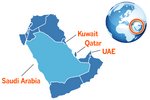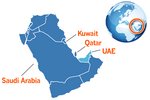There are many calendars in use in the world today, and that
by which the Western world operates is the Gregorian
calendar. This calendar has 365 days (or 366 days every four years
for leap year), and is based on one solar year.
Saudi Arabia traditionally follows the Islamic, or Hejira calendar, but in December 2016 they announced a transition to the Gregorian Calendar. During the transition, both calendars were used. And, in November 2023, the Saudi Cabinet approved the use of the Gregorian calendar for all official business. (The Hejira calendar will continue to be used for religious dates.)
The Islamic calendar has 12 months, each with 29 or 30 days. Therefore, the Islamic
calendar year is 11 days shorter than the Gregorian calendar
year.
Note: Other Gulf countries typically use the Islamic calendar for religious purposes, but the Gregorian for secular purposes.
The names of the months in the Islamic calendar are: Muharram; Safar; Rabi' al-awwal; Rabi' al-thani; Jumada al-awwal; Jumada al-thani; Rajab; Sha'aban; Ramadan; Shawwal; Dhu al-Qi'dah; Dhu al-Hijjah.
The names of the days of the week are: yaum al-ahad ("first
day," i.e., Sunday); yaum al-ithnayn ("second day," i.e.,
Monday); yaum ath-thalatha ("third day," i.e., Tuesday);
yaum al-arbia'a ("fourth day," i.e., Wednesday); yaum al-
khamis ("fifth day," i.e., Thursday); yaum al-jumu`a
("gathering day," i.e., Friday - this is the holy day, you
may often hear references in the news to "Friday prayers");
yaum as-sabt ("Sabbath day," i.e., Saturday).
Practically speaking, those working in Saudi Arabia will
notice a few differences:
• Dates on official documents, e.g., employment contracts, may be cited in the Islamic calendar, the Gregorian calendar, or both.
• While it is simple (for astronomers!) to calculate the
cycle of the astronomical moon to prepare the calendar in
advance, technically speaking, each month starts when the
lunar crescent is first seen (by a human observer) after a
new moon. As a result, it is possible for months in the
Islamic calendar to be a day longer.
• Since June 2013, the weekend in Saudi has been Friday and Saturday (previously
it was Thursday and Friday). The holy day is Friday.
• People are typically paid either at the very end of, or start of, a Gregorian month.
If you refer to Gregorian dates, people will
understand what you are talking about.






